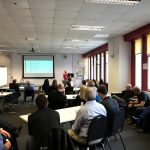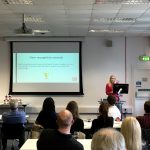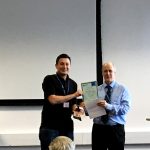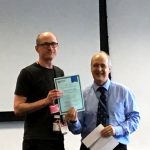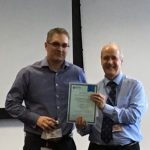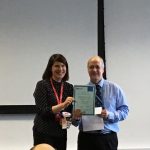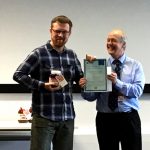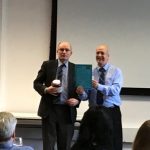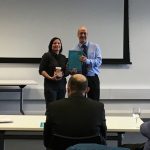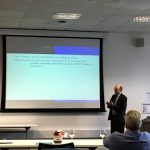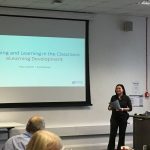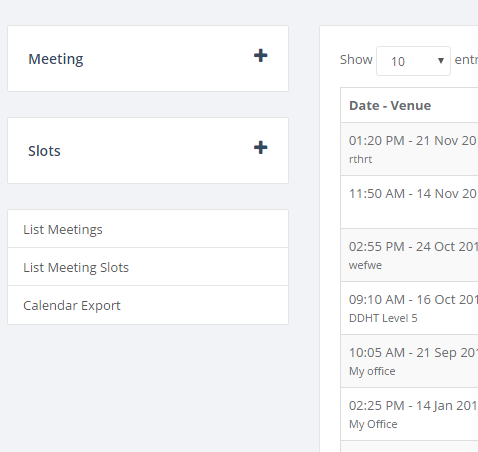I recently attended the Turnitin UK Academic Integrity Summit 2017 held in Newcastle Upon Tyne. This was a very timely conference following the release of the QAA report into contract cheating. I was concerned that this would be a day-long sales pitch from Turnitin but was pleasantly surprised to find the opposite. There were many presentations from institutions around the world, but very little ‘grandstanding’ from Turnitin.
Stephen Gow, Academic Integrity Coordinator, University of York
The first session I attended was a look at the approach from the University of York towards academic integrity. They discussed the importance of the language used at the University, moving away from terms such as “plagiarism” towards “academic integrity”. All their students have a mandatory academic integrity online tutorial they must complete in Semester 1 of Stage 1. They are working closely with the student union on their “integrity week” and are also working more closely with staff, including on their Postgraduate Certificate in Academic Practice (PGCAP).
Turnitin Data Workflows
The second session was a discussion session with the Turnitin staff exploring the types of data and statistics institutions would like to get out of Turnitin. This included reports on feedback return time, statistics around number of students receiving extensions, archiving, learning analytics, and reporting on the various functions used. We hope Turnitin will use this in the further developments of the software.
Bill Loller, Turnitin
The third session was facilitated by Bill Loller, Chief Product Officer at Jobvite, who is working on a technical solution to expose contract cheating for Turnitin. They are using expertise from the field of forensic linguistics to develop a product. Forensic linguistics may be used in a court case to determine whether a person did, or did not, write a document. They are currently testing their modelling and developing a report that will provide a confidence score.
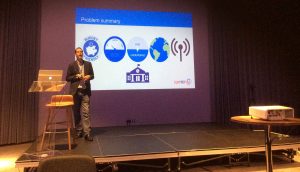 Bill continued this theme into a larger session with the group, showing some of the contract cheating/essay mills websites prevalent online. He admitted that Turnitin may have helped with this problem – “crack down on plagiarism and students will look elsewhere”. These websites offer 10,000 words for approximately £300.
Bill continued this theme into a larger session with the group, showing some of the contract cheating/essay mills websites prevalent online. He admitted that Turnitin may have helped with this problem – “crack down on plagiarism and students will look elsewhere”. These websites offer 10,000 words for approximately £300.
Simon Bullock, QAA
Simon Bullock from the QAA was next to discuss his recent publication “Contracting to Cheat in Higher Education – How to Address Contract Cheating, the Use of Third-Party Services and Essay Mills.” He discussed the risks to the public if students were obtaining their degrees through cheating but that despite attempts it is not yet illegal to offer essay mill services online. The QAA is exploring as many non-legislative methods as possible.
Irene Glendinning, Coventry University
Irene Glendinning of Coventry University presented her research work analysing the impact of policies for plagiarism in Higher Education across Europe. She highlighted the UK and Ireland as being some way ahead of many other countries in Europe. They have developed an academic integrity maturity model, a tool to compare the results of the impact analysis across 27 EU member states.
Cath Ellis, New South Wales
The presentation that had the most impact on me was from Cath Ellis from the University of New South Wales. Cath reported that there was too much anecdotal information forming decisions, and not enough hard data.
To find out how many students are using contract cheating services, Cath asked them anonymously. Out of the 14,096 students surveyed around 6% (n=814) admitted to cheating in some form during their programme. The vast majority of this cheating comes in the form of assistance from other or former students. It is not commercially driven. The cheating group’s attitudes show they are less likely to think it’s wrong, although there was no discernible difference between English and non-English speaking students. Non-English speaking students are as likely to think cheating is wrong as English speaking students. Other findings of the study showed that when there are perceptions that there are a lot of opportunities to cheat, cheating goes up. And when there is dissatisfaction with the teaching environment, cheating goes up.
Cath discussed the need for students to have “ethical fitness” – we should not try to remove every opportunity to cheat as students need to be ethical.
She then discussed the various types of contract cheating and review some of the typical websites.
Assessment design is widely advocated as a possible solution to contract cheating, but Cath argued that this is a myth. We should not change our assessment design because of a small percentage of cheaters. Reduced assessment time (shorter deadlines) will actually drive students towards essay mills.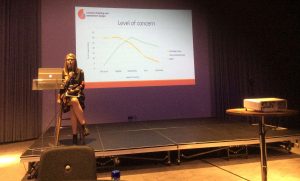
Cath noted that we are not having the correct conversations with students and advised us to discuss contract cheating with them. Part of the study looked at the perceptions of how prevalent contract cheating is, compared to how damaging it is. 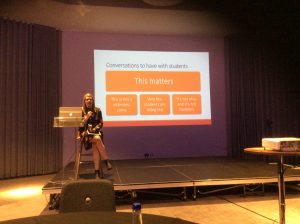 The study showed that students in the cheating group thought that a lot of students were doing it and it was not that serious. Staff members thought it was not very common but it was very serious. Students in the non-cheating group followed the same path as the students in the cheating group. They also thought that lots of students were doing it while it was not very serious.
The study showed that students in the cheating group thought that a lot of students were doing it and it was not that serious. Staff members thought it was not very common but it was very serious. Students in the non-cheating group followed the same path as the students in the cheating group. They also thought that lots of students were doing it while it was not very serious.
Professor Phil Newton – Swansea University
The last presentation was given by Professor Phil Newton from Swansea University. He presented various research projects that explored academic integrity.
I found the event extremely useful and I have reflected since on the way Newcastle University approaches academic integrity. The presentation from Cath Ellis convinced me that we should not be changing any approaches to assessment to attempt to counter the small number of cheating students, but we should be minimising their opportunities to cheat. We also need to be having more conversations with staff and students about the promotion of academic integrity, and the impact contract cheating could have on their career.





